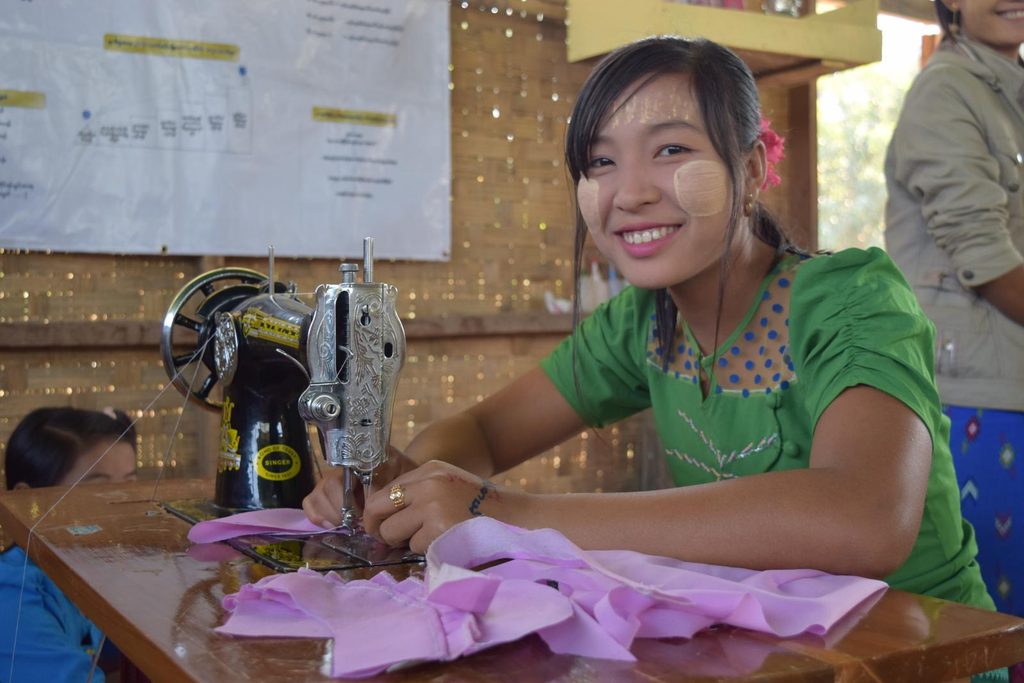Over 170 girls in 8 communities are developing new skills to financially support themselves in Myanmar.

Daw Yin Yin May has been teaching sewing classes for the past 25 years.
For 3 months she is leaving her home in Yangon to teach 25 girls in Rakhine State to sew. The hardest part isn’t having a class of beginners, but taking the boat to and from work each day. She’s still scared of the water.
With no electricity, the class of girls have learnt to sew by hand and on sewing machines they power using their feet.
Employment in Rakhine State
When adolescent girls finish school in Rakhine State, there are few career options. Many turn to farming or work as day labourers. Building a road or harvesting crops can earn them as little as $3 USD per day, although this work is never guaranteed.
Storms and droughts can destroy crops and leave entire communities without guaranteed income for months, and it’s teenage girls who often face the greatest impacts of this unpredictable lifestyle. Many marry young or move the bigger cities in search of work. Far from their families, they are vulnerable, uneducated and have limited career options.
Over 170 girls in 8 communities are developing new skills to financially support themselves. Communities also received sewing machines so the girls can continue to learn and earn an income.
Teachers like Daw Yin Yin May spend 3 months teaching the girls everything, from identifying parts of a sewing machine to making their own clothes. They also train a local teacher who is based in each community, so the training can continue once the teacher leaves.
“I’m very honored to be their teacher. The students are very happy and motivated, so this makes me happy. At the beginning they learnt by practicing on newspaper, but now they can make real shirts,” she explains.
“All of the students are casual laborers, so their lives are really hard. After this I hope they can live under the roof (work indoors).
“I’m really satisfied with the students. They are very honest and smart. I’ve noticed this even in the small time I’ve been their trainer. I don’t have any children, but love them a lot.”
Working “under the roof”
“At the beginning we used paper to practice,” explains 18-year-old sewing student U Naw Li.
“We measured the body size and learnt how to use the machines. We love sewing fashionable, sophisticated and up to date dresses.”
“Before we knew nothing about sewing but now we fully understand how to sew and create our own designs.
Our parents encourage us to accomplish many things because it’s a great opportunity for us.
“We don’t even have a primary education so our parents encourage us a lot.”
U Naw Li is 1.5 months into her training, and she is currently working as a day labourer. There is no high school in her village so it is difficult for her to find employment. For the past year she has participated in Plan International Myanmar’s Non-Formal Education programme, where she has learnt basic literacy and numeracy skills.
“There are a lack of opportunities for uneducated people in my village,” she says. “I’m going to Yangon this year after Thingyan (Myanmar New Year). I’m going to work in a garment factory. This training will support me a lot. I want to send money home and support my family.”
Plan International Myanmar has also held food preparation training and mechanics training. The trainings are part of an education in emergencies project that builds the skills of students who miss out on traditional schooling due to conflict, remoteness and lack of teaching resources. It provides students with an opportunity to learn skills that will support them to make a long-term difference in their communities.
Categories: Skills and work


